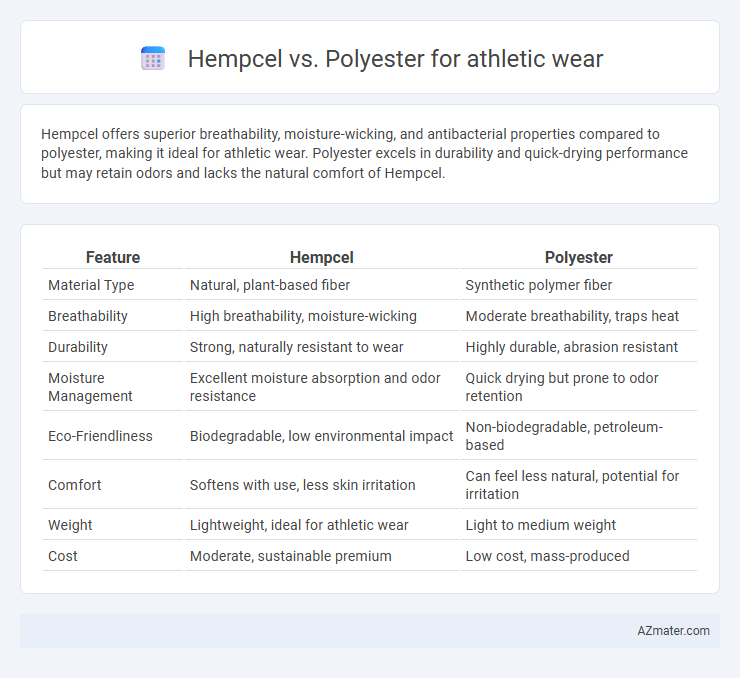Hempcel offers superior breathability, moisture-wicking, and antibacterial properties compared to polyester, making it ideal for athletic wear. Polyester excels in durability and quick-drying performance but may retain odors and lacks the natural comfort of Hempcel.
Table of Comparison
| Feature | Hempcel | Polyester |
|---|---|---|
| Material Type | Natural, plant-based fiber | Synthetic polymer fiber |
| Breathability | High breathability, moisture-wicking | Moderate breathability, traps heat |
| Durability | Strong, naturally resistant to wear | Highly durable, abrasion resistant |
| Moisture Management | Excellent moisture absorption and odor resistance | Quick drying but prone to odor retention |
| Eco-Friendliness | Biodegradable, low environmental impact | Non-biodegradable, petroleum-based |
| Comfort | Softens with use, less skin irritation | Can feel less natural, potential for irritation |
| Weight | Lightweight, ideal for athletic wear | Light to medium weight |
| Cost | Moderate, sustainable premium | Low cost, mass-produced |
Introduction to Hempcel and Polyester in Athletic Wear
Hempcel, a sustainable fabric derived from hemp fibers, offers superior breathability, moisture-wicking, and natural antimicrobial properties, making it ideal for athletic wear that requires comfort and odor control. Polyester, a synthetic fiber widely used in sports apparel, is known for its durability, quick-drying capabilities, and excellent stretch, providing reliable performance during intense workouts. Both materials serve distinct functions in athletic wear, balancing eco-friendliness and high-performance features.
Fabric Composition: What Are Hempcel and Polyester?
Hempcel is a sustainable fabric derived from hemp fibers combined with cellulose, known for its breathability, moisture-wicking properties, and natural antimicrobial benefits. Polyester, a synthetic fiber made from petroleum-based products, offers durability, elasticity, and strong moisture resistance, making it popular in athletic wear. The fabric composition of Hempcel blends natural plant fibers with cellulose to enhance comfort and eco-friendliness, while polyester relies on synthetic polymers for performance and stretch.
Sustainability and Environmental Impact
Hempcel fibers are derived from hemp plants, offering high biodegradability and requiring less water and pesticides compared to polyester, which is petroleum-based and non-biodegradable. The production of Hempcel emits fewer greenhouse gases and reduces microplastic pollution in waterways, making it a more sustainable choice for athletic wear. Polyester's durability and moisture-wicking properties are offset by its significant environmental footprint during manufacturing and end-of-life waste challenges.
Breathability and Moisture-Wicking Properties
Hempcel fabric offers superior breathability compared to polyester, allowing better air circulation and reduced heat retention during intense workouts. Its natural moisture-wicking properties efficiently draw sweat away from the skin, helping athletes stay dry and comfortable. Polyester, while moisture-wicking, tends to trap heat and can retain odors, making Hempcel a more breathable and fresh option for athletic wear.
Comfort and Skin Sensitivity
Hempcel fibers offer superior breathability and natural moisture-wicking properties, making them ideal for athletic wear that prioritizes comfort and skin sensitivity. Unlike polyester, which can trap heat and cause irritation or allergic reactions for sensitive skin, hempcel provides a soft, hypoallergenic texture that reduces the risk of chafing and rashes. Athletes seeking sustainable, skin-friendly fabrics often prefer hempcel for its durability combined with breathable, calming comfort during intense workouts.
Durability and Longevity
Hempcel fabric offers superior durability and longevity compared to polyester due to its natural fibers, which resist wear and tear while maintaining strength through repeated use and washing. Polyester, while lightweight and moisture-wicking, tends to degrade faster under high friction and frequent laundering, leading to pilling and loss of structural integrity. Athletes seeking long-lasting, resilient performance wear benefit from Hempcel's eco-friendly composition combined with its robust tensile strength, providing sustained durability over time.
Performance in High-Intensity Workouts
Hempcel fabric offers superior moisture-wicking and breathability compared to polyester, keeping athletes cooler and drier during high-intensity workouts. Its natural antimicrobial properties reduce odor buildup, enhancing comfort over extended periods of exertion. Polyester excels in durability and stretch, providing excellent shape retention and resistance to wear and tear in rigorous training sessions.
Cost and Availability
Hempcel fabric, derived from hemp fibers, tends to be more expensive than polyester due to its eco-friendly production process and limited manufacturing scale. Polyester is widely available and cost-effective, benefiting from mass production and global supply chains, making it a common choice for athletic wear. The cost difference significantly impacts brand decisions, with hempcel favored for sustainable lines despite higher prices, while polyester dominates mainstream athletic apparel due to affordability and accessibility.
Style, Texture, and Aesthetic Appeal
Hempcel fabric offers a natural, matte finish with a slightly coarse texture that softens over time, providing breathable comfort ideal for athletic wear, while polyester delivers a smooth, shiny surface with moisture-wicking properties for a sleek, performance-driven look. The earthy, organic aesthetic of Hempcel appeals to eco-conscious consumers seeking sustainable style, contrasting with polyester's modern, vibrant appearance favored in high-intensity sportswear. Both materials offer distinct advantages, with Hempcel emphasizing durability and a rustic charm, and polyester excelling in elasticity and color retention for dynamic, fashionable athletic apparel.
Final Comparison: Which is Better for Athletes?
Hempcel offers superior breathability, moisture-wicking, and natural antimicrobial properties, making it ideal for athletes seeking comfort and odor control during intense workouts. Polyester excels in durability, quick-drying, and elasticity, providing enhanced shape retention and performance in high-impact activities. While hempcel prioritizes sustainability and natural fiber benefits, polyester remains favored for its resilience and cost-effectiveness in athletic wear.

Infographic: Hempcel vs Polyester for Athletic wear
 azmater.com
azmater.com